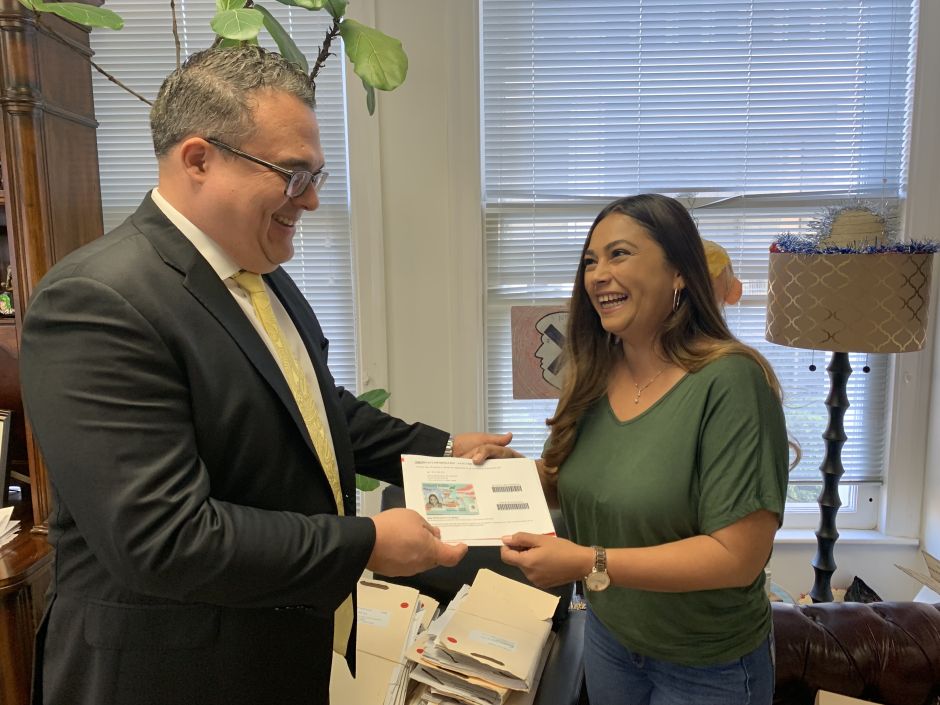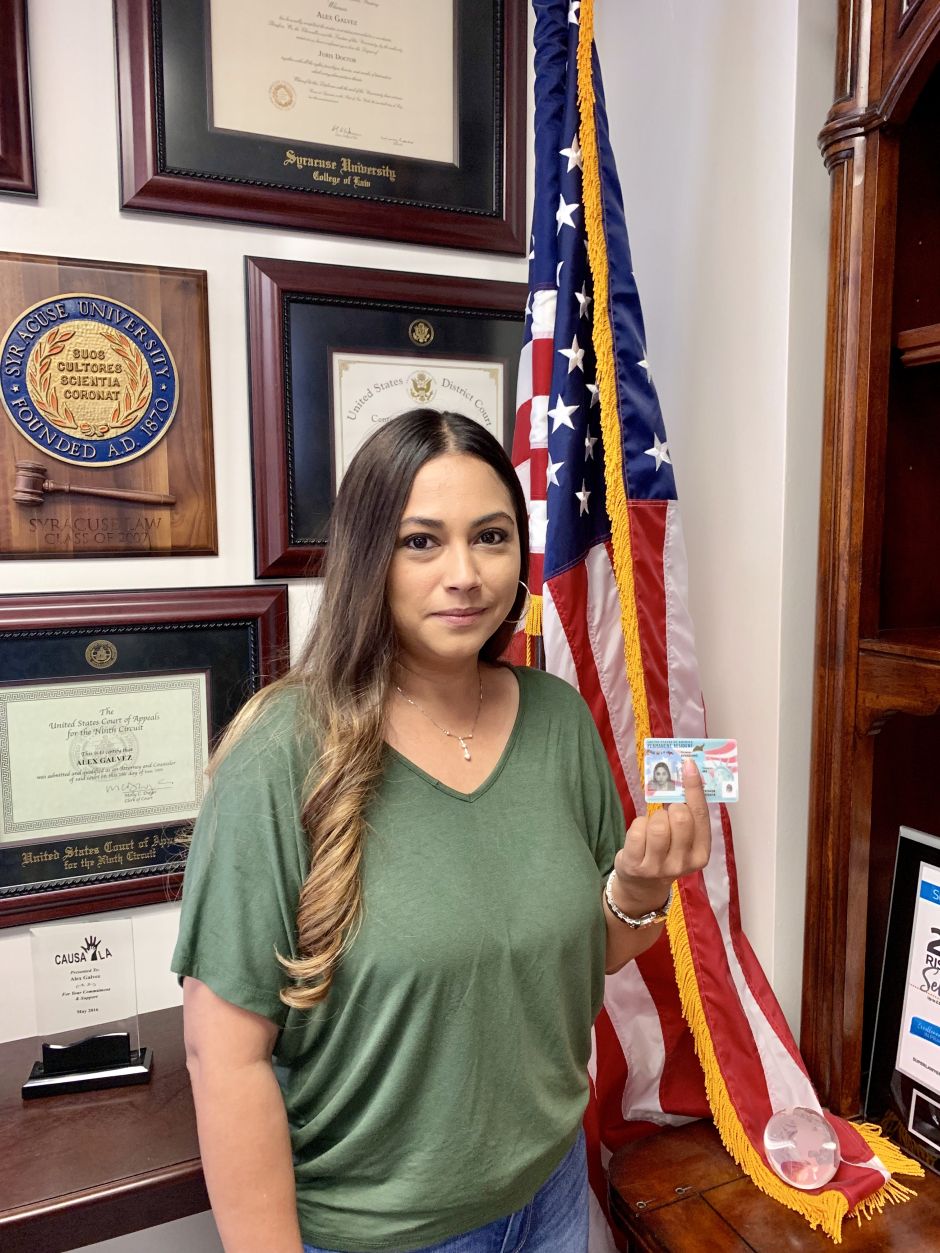The beneficiaries of this program are urged to have a U.S. citizen spouse or child over the age of 21 to adjust their status
Yeni Avendaño, a Salvadoran who emigrated to Los Angeles as a child, became a permanent resident of the United States, thanks to a ruling in the appeals courts that allows certain people benefiting from the Temporary Protected Status (TPS) to obtain residency .
"When I received the letter of approval of the residence, I stressed, cried, thanked God and said why I had not done this before ”says Yeni, mother of three daughters of 16 years, 7 years and six months born in the United States.
Since President Trump announced the end of TPS for Salvadorans in January 2018, Yeni panicked. “I was very afraid that they would stop me and deport me. I did not want to return to El Salvador without my daughters, and take them to my country where things are too difficult, I was very distressed, ”he says.

A key factor for Yeni to obtain residency was his marriage to a US citizen, the father of his three daughters.
A decision in the Ramirez lawsuit against Brown in the Court of Appeals for the Ninth Circuit in 2017 allows TPSians married to a U.S. citizen; or with a child over 21 years old born in the USA, apply for residence even if they did not have a legal entry into the country. Another previous 2013 ruling in the Flores vs. USCIS lawsuit allows the TPSians to adjust their status through immediate family members.
However, for TPSians to adjust their status through these rulings, they must reside in the states attached to their jurisdiction. The jurisdiction of the Ninth Circuit of the Court of Appeals covers California, Alaska, Arizona, Hawaii, Idaho, Montana, Nevada, Oregon, Washington, and the Guam and Northern Mariana Islands. The Sixth Circuit of the Court of Appeals includes Kentucky, Michigan, Ohio, Tennessee and Cincinnatti.
Before the Ramirez decision, Yeny would not have been able to adjust her immigration status through her husband because she entered the country undocumented, and when she had the TPS she never applied for a travel permit (Advance Parole) with which she would have had a legal entry. To obtain residency through her citizen husband, without the Ramirez decision, she would have had to do so through the US Consulate in El Salvador.

Yeny came to the US at age 12 in 1994. He married a US citizen. She did not worry about fixing her immigration status because she felt confident. "I thought I would always have the TPS," he acknowledges.
But when President Trump announced the end of this program, he got scared.
“They were days of a lot of stress, headache and not being able to sleep. My oldest daughter cared a lot, and she sent me messages to let me know when she knew about a police checkpoint in the street. He asked me to not leave the house, ”he says.
Concerned in search of a solution for their immigration status, last year, she looked for immigration lawyer Alex Gálvez. “He told me that my case was very easy because I had the TPS. He asked me, why I hadn't done it before, ”he remembers.
Very nervous, accompanied by her husband and the lawyer, she showed up for her residency appointment on October 16.
“Between October 24 and 25, I received the approval letter. That day I could breathe easy and let go of the body. Life changes me with the resident card. He has changed them all in my family. My husband, my children and my parents are happy, ”confesses this young mother of 37 years.
She is so happy that she says that in three years, she wants to carry out her plan to become a citizen. "I want to have the right to vote and participate in the elections," he says. He also reveals that he would like to study. “I work in accounting, but what I know, I have learned in practice. Now I want to go to college to have the degree. That has always been my dream, but it was too expensive, ”he says.
Loading the player …
Take advantage of TPS extension
Attorney Gálvez urged the TPSianos to take advantage of the extension of this program for another year because they only have this benefit, they already have a legal entry if they live within the Ninth or Sixth Circuit of the Court of Appeals.
“People who have a child citizen of the United States over the age of 21 or are married to a citizen are eligible for permanent residence without having to leave the country and ask for forgiveness.”, Precise.
Emphasize that this applies to those who have never had deportation and taken them out of the country.
However, he points out that judges in Los Angeles are approving many of the motions to reopen TPSianos cases with deportation orders so they can become residents.
“Right now it is a very good time. In recent weeks we have submitted more than 50 requests to reopen cases; and 49 were approved for those TPSians who had a deportation order. They are being approved in a very high percentage because they know that at the end of the day they will result in residence, ”he says.
Galvez tells TPS beneficiaries that they have a similar situation to talk with an immigration lawyer so they can reopen their cases and become residents.
"If they do not have deportation, I want them to remember that the act of having active and current TPS is automatically a legal entry, and they have to submit the residency petition if they are married to a citizen or have a child over the age of 21. They must do so as soon as possible so that they have their migration appointment within the TPS extension period"He exposes.
"It is a very big thing that this program has been extended for another year because it opens the window to submit requests to reopen cases, and finish everything before it ends again," he observes.
Salvadorans are the largest group of beneficiaries with the TPS with around 200,000. In early November, the administration of President Trump extended the TPS for one year to the beneficiaries of six countries: El Salvador, Honduras, Nicaragua, Sudan, Nepal and Haiti.







